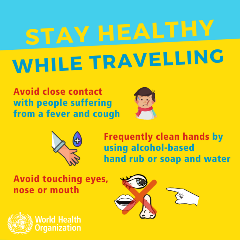Travel and tourism sector
WHO has provided hotel, restaurant, catering, and administration and industry associations guidance for putting in place action plans to protect the safety of staff and clients.
Recommendations are provided on:
- Necessary training
- How to clean and disinfect high touch surfaces in public areas and rooms occupied by ill persons.
- Consideration of teleworking
- Screening process for staff coming to work
- Policies for safe return to work post exposure and post recovery from the illness
- Management of gym facilities
The full guidance is available here.
Operational considerations for COVID-19 management in the accommodation sector: interim guidance
UN COVID-19 Response: Launch of policy brief on covid-19 and transforming tourismQuestions and Answers:Q&A: Staying at hotels and accommodation establishments...
Guidance
Operational considerations for COVID-19 management in the accommodation sector
Hotels and tourism accommodation establishments are places where guests stay temporarily in close cohabitation and where there is a high degree of interaction among guests and workers, which requires specific attention in the context of COVID-19. The document offer guidance to collective tourism accommodation establishments such as hotels and similar establishments, holiday and other short-stay accommodation, and campsites.
- Access the operational considerations document
Management of ill travellers at point of entry
Management of ill travellers at points of entry – international airports, seaports and ground crossings – in the context of COVID -19 outbreak
This document aims to provide advice on the detection and management of ill travellers suspected of COVID-19 infection, at international airports, ports and ground crossings.
- Access the point of entry document
Public health preparedness and response aviation sector
Handbook for the management of public health events in air transport
The target audience for this guidance document includes the national focal points (NFP) for the IHR and public health authorities at PoE, as well as national aviation regulatory authorities, airport operators and personnel, aircraft operators, air crew and other stakeholders involved in air transport and emergency preparedness and response to public health events.
- Access the management handbook
- Access the aviation operational handbook
Public health preparedness and response for maritime sector
Operational considerations for managing COVID-19 cases/outbreak on board ships
The target audience of this documents is any authority involved in public health response to
a COVID-19 public health event on board ships, including International Health Regulations
(IHR) National Focal Point (NFP), port health authorities,
local, provincial and national health
surveillance and response system, as well as port operators and ship operators.
- Access the ships operational document
Handbook for management of public health events on board ships
To assist States Parties in contingency planning and implementation of health measures on board ships or in ports, WHO developed a generic guidance addressing all public health risks and related rules and regulations.
- Access the ships management handbook
This handbook is intended to be used as reference material for port health officers, regulators, ship operators and other competent authorities in charge of implementing the IHR (2005) at ports and on ships.
- Access the sanitation handbook
Risk communication and community engagement
A guide to preventing and addressing social stigma associated with COVID-19
Social stigma in the context of health is the negative association between a person or group of people who share certain characteristics and a specific disease. In an outbreak, this may mean people are labelled, stereotyped, discriminated against, treated separately, and/or experience loss of status because of a perceived link with a disease.
The current COVID-19 outbreak has provoked social stigma and discriminatory behaviours against people of certain ethnic backgrounds as well as anyone perceived to have been in contact with the virus.
- Access the social stigma publication
Mental health considerations during COVID-19 outbreak
These mental health considerations were developed by the Mental Health Department as support for mental and psychological well-being during COVID-19 outbreak.
- Access the mental health publication
Infographics
Publications
All →Heat, air pollution and solar ultraviolet radiation: mass gathering-specific considerations and research...
The annually averaged global mean near-surface temperature in 2024 was 1.55 °C ± 0.13 °C above the 1850–1900 average. This made it...
Framework and toolkit for infection prevention and control outbreak preparedness, readiness and response
As observed in recent large-scale outbreaks, health facilities (HFs) with limited or no infection prevention and control (IPC) capacities can amplify emerging...
Strategic plan for coronavirus disease threat management: advancing integration, sustainability, and...
The WHO strategic plan for coronavirus disease threat management sets out the global framework for the sustained, integrated and evidence-based management...
Tailoring event-based surveillance using open sources: practical guide for mass gatherings
Public health intelligence (PHI) is key to early warning alert and response (EWAR), and is vital in protecting the health of the populations in the context...






